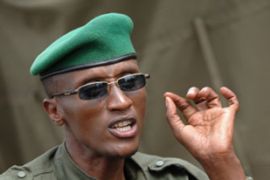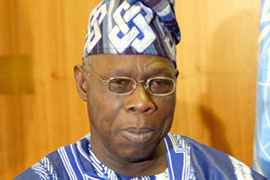Kenya hosts DR Congo crisis talks
Ceasefire under strain as pro-government militias continue attacks in eastern Congo.

Attending the Nairobi summit will be Ban Ki-moon, the UN chief; the presidents of the DRC, Rwanda, Kenya, Uganda, Tanzania and Burundi; and Olusegun Obasanjo, the UN’s newly appointed envoy to the DRC and former Nigerian president.
General Laurent Nkunda, who heads the rebel movement fighting the Congolese government, is not attending the talks.
He said the crisis would not end his rebellion unless it could convince Kabila to negotiate directly with him.
“It’s only a regional summit. It doesn’t have any impact on our demands,” Nkunda told the Reuters news agency by telephone on Friday.
Thousands of civilians have fled fighting in eastern Congo despite an official ceasefire.
Militia blamed
Civilians escaping clashes said the attacks had been started by pro-government Mai-Mai militia members.
UN peacekeepers found on Thursday the corpses of at least a dozen civilians in Kiwanja, a town 70km north of Goma, the capital of Nord-Kivu.
| Video | ||||||
|
The bodies of adult males – five in a single room – bore marks of being hit by rockets or grenades.
There were no indications that the dead men had been fighters and some were reported as wearing work overalls.
Kudura Kasongo, a spokesman for Kabila, said on Friday in Nairobi that the UN had done nothing to stop killings of civilians by the rebels.
“People are being slaughtered and Monuc did nothing,” he said.
Zeina Awad, reporting for Al Jazeera from Nairobi, said parties to the talks had come to the negotiating table with “divergent starting points and demands”.
“[General] Nkunda wants the Congolese government to disarm Hutu militias associated with the genocide in Rwanda and the Congolese government wants Rwanda to stop supporting him [Nkunda], which the Rwandan government denies,” she said.
Awad said the UN would seek a stronger mandate and 3,000 troops to supplement the existing 7000-strong force in the Congo.
UN peacekeepers said they had launched an operation around the town, to try to halt the fighting.
Assurance
The Nord-Kivu government army commander blamed the militia for the clashes and said his own forces would respect the ceasefire.
On Wednesday, Nkunda said he was upholding the ceasefire he declared last week after halting his forces’ advance towards Goma, where aid agencies are struggling to help some of an estimated million refugees displaced by two years of conflict in Nord-Kivu.
 |
| Obasanjo, the UN envoy to eastern Congo, is to mediate talks on the conflict [GALLO/GETTY] |
“It’s still being maintained,” Nkunda told the Reuters by telephone from his hilltop headquarters in North Kivu.
Arthur Kepel, an analyst with the International Crisis Group in Congo’s capital, Kinshasa, told Al Jazeera that it was “very significant” that the goverment is willing to enter talks with the rebels.
“It is only through dialogue that the ceasefire can be implemented … it is really the answer if one has to stop this crisis,” he said.
The conflict in eastern Congo, which persists years after the end of a wider 1998-2003 war, is fuelled by ethnic hatred left over from Rwanda’s 1994 genocide.
Nkunda claims the Congolese government has not protected ethnic Tutsis from the Rwandan Hutu militia that escaped to Congo after helping slaughter a half-million Rwandan Tutsis.
Nkunda, who defected from the army in 2004, now says he is fighting to liberate all of Congo from a corrupt government.
He went on the offensive on August 28 and brought his fighters to the edge of Goma last week before declaring a unilateral ceasefire.


